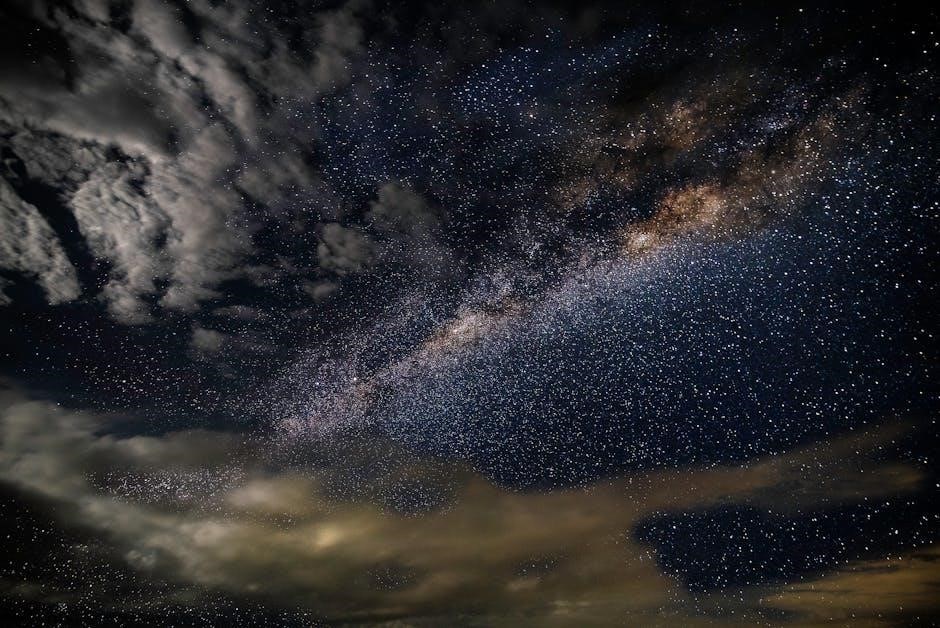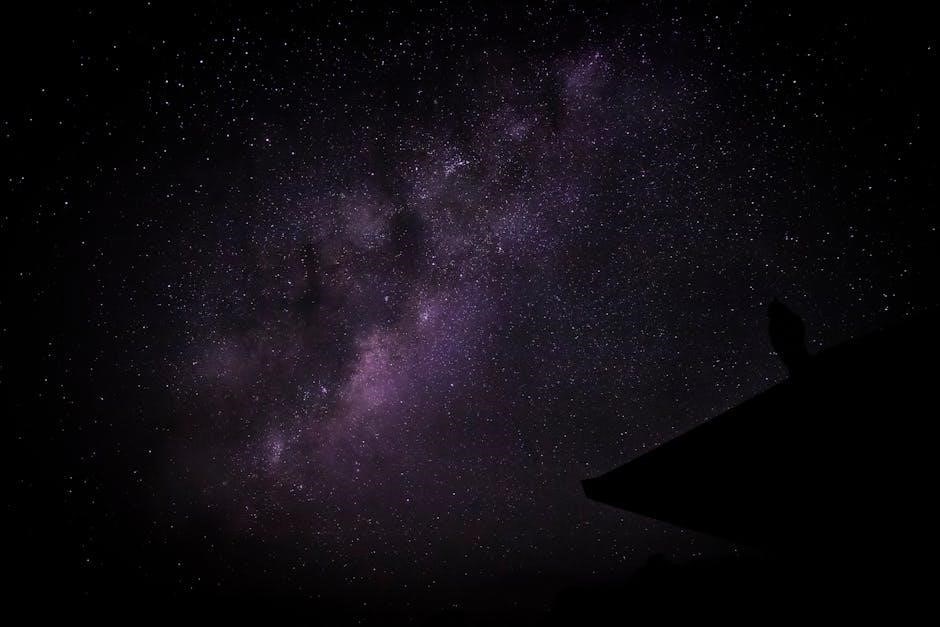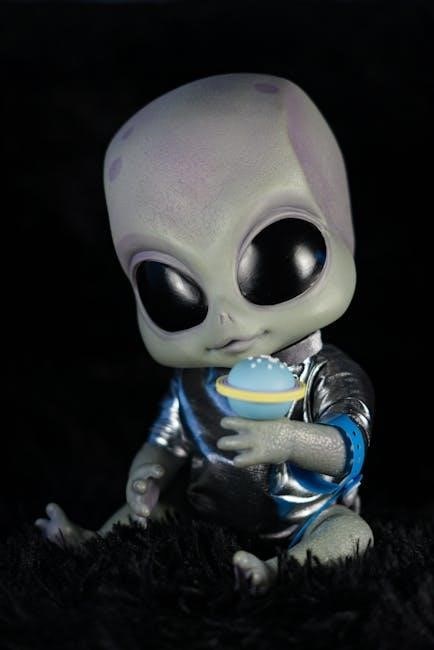The Hitchhiker’s Guide to the Galaxy PDF is a convenient digital format of Douglas Adams’ iconic novel, offering readers a humorous and satirical journey through space.
It follows the misadventures of Arthur Dent and Ford Prefect as they escape Earth’s destruction, blending science fiction with witty observations on humanity and the cosmos.
Available in various editions, the PDF version ensures easy access to this cult classic, making it a must-read for fans of comedic sci-fi and adventure.
Overview of the Book
The Hitchhiker’s Guide to the Galaxy is a comedic science fiction novel by Douglas Adams, first published in 1979. Originally adapted from a BBC radio series, the book follows the journey of Arthur Dent, an unwitting human, and Ford Prefect, an alien researcher, as they travel through space after Earth’s destruction. The story is framed around a fictional guidebook, offering humorous insights into alien worlds, eccentric characters, and the absurdity of the universe. Its unique blend of wit, satire, and imaginative storytelling has made it a cult classic, resonating with readers worldwide.
Author Background: Douglas Adams
Douglas Noel Adams was a renowned English author, screenwriter, and humorist, best known for The Hitchhiker’s Guide to the Galaxy. Born on March 11, 1952, Adams began his career in radio and television, contributing to shows like Doctor Who and Monty Python’s Flying Circus. His unique blend of comedy and science fiction led to the creation of the Hitchhiker’s series, which started as a radio play in 1978 and later expanded into novels, becoming a global phenomenon. Adams’ work is celebrated for its wit, creativity, and philosophical depth, leaving a lasting legacy in literature and pop culture.
Popularity and Availability in PDF Format
The Hitchhiker’s Guide to the Galaxy remains a cult classic, with its PDF format widely sought after for its convenience. The book’s blend of humor, science fiction, and philosophy has attracted a global audience. Available across various platforms, including Amazon and Internet Archive, the PDF version ensures easy access for readers. Its popularity endures, making it a staple in digital libraries, while its themes continue to resonate with fans of all ages, solidifying its place as a timeless literary treasure.
Plot Summary
Arthur Dent escapes Earth’s destruction with Ford Prefect, an alien researcher, and embarks on a chaotic journey through the galaxy, encountering bizarre worlds and comedic misadventures.
Main Storyline
The story begins with Earth’s demolition to make way for a hyperspace bypass, where Arthur Dent, an unwitting human, is rescued by his friend Ford Prefect, an alien researcher for the fictional guidebook The Hitchhiker’s Guide to the Galaxy. Together, they embark on a chaotic journey through space, encountering strange worlds, eccentric characters, and comedic misadventures. Their quest leads them to the planet Magrathea, where Earth’s replacement is being constructed, and they uncover the ultimate question to life, the universe, and everything, revealing the series’ blend of humor, satire, and sci-fi exploration.
Key Characters: Arthur Dent and Ford Prefect
Arthur Dent, an ordinary human, finds himself thrust into an extraordinary adventure after Earth’s destruction. His friend Ford Prefect, an alien researcher for The Hitchhiker’s Guide to the Galaxy, rescues him, revealing his true identity. Arthur’s relatable anxiety and bewilderment contrast with Ford’s calm, experienced demeanor. Their dynamic drives the story, with Ford guiding Arthur through the galaxy’s absurdities, showcasing their friendship and cultural differences. Ford’s role as a researcher adds depth, highlighting the guide’s significance in their journey.
The Destruction of Earth and Beyond
The novel begins with Earth’s demolition to make way for a hyperspace bypass, a shocking event that propels Arthur Dent into the galaxy. Rescued by Ford Prefect, he learns about the guide’s prediction of the destruction. This event sets the stage for their cosmic adventures, exploring themes of existential crisis and the universe’s indifference. The destruction symbolizes humanity’s insignificance, while the journey beyond reveals the vast, unpredictable nature of space, blending humor with philosophical reflections on existence.

Main Characters in The Hitchhiker’s Guide to the Galaxy
The story revolves around Arthur Dent, Ford Prefect, Zaphod Beeblebrox, Trillian, and Marvin, each uniquely contributing to the humor and depth of the cosmic adventure.
Arthur Dent: The Reluctant Hitchhiker
Arthur Dent is an ordinary Earthman thrust into the extraordinary when his home is demolished to make way for a hyperspace bypass. Rescued by his friend Ford Prefect, an alien researcher, Arthur embarks on a journey through the galaxy; Clumsy and often overwhelmed, he represents humanity’s resilience in the face of cosmic chaos. With his towel and fish, Arthur navigates unimaginable situations, embodying the quintessential reluctant hero. His story is one of survival, humor, and unexpected growth.
Ford Prefect: The Alien Researcher
Ford Prefect, an alien researcher from Betelgeuse, is Arthur Dent’s unlikely rescuer. Working on the Hitchhiker’s Guide to the Galaxy, Ford is calm, resourceful, and oddly human-like. His dry wit and vast knowledge of the cosmos contrast with Arthur’s Earthly naivety. Despite his cynical demeanor, Ford’s loyalty shines through as he navigates the galaxy, often underestimating Earth’s significance; His role as both guide and friend makes him a pivotal character in Arthur’s journey, blending humor with interstellar expertise.
Zaphod Beeblebrox: The Two-Headed President
Zaphod Beeblebrox, the charming yet self-centered two-headed president of the galaxy, adds chaos and unpredictability to the story. His dual heads symbolize his conflicting personalities, blending confidence and recklessness. As a central figure in the Hitchhiker’s Guide, Zaphod’s adventures aboard the Heart of Gold starship showcase his cunning and ambition. His character represents the blend of humor and satire, making him a memorable and dynamic figure in the galaxy’s political and social landscape.
Trillian: The Human Companion
Trillian, a brilliant and resourceful human woman, plays a pivotal role in the story. Rescued by Zaphod Beeblebrox before Earth’s destruction, she embodies intelligence and adaptability. Her calm demeanor contrasts with the chaos around her, making her a voice of reason. Trillian’s journey highlights her resilience and wit, as she navigates the complexities of intergalactic travel alongside Arthur Dent. Her character adds depth to the narrative, showcasing humanity’s potential in an unpredictable universe.
Marvin: The Paranoid Android
Marvin: The Paranoid Android
Marvin, the Paranoid Android, is a deeply depressed and pessimistic character whose perpetual gloom provides comedic relief. His intelligence and ability to compute complex probabilities are overshadowed by his existential despair. Marvin often expresses his hopelessness, yet his loyalty to the crew, particularly Arthur Dent, endears him to readers. His dry wit and humorous pessimism make him a memorable and beloved character in the series, encapsulating the absurdity of life in the universe;

Themes and Motifs
The Hitchhiker’s Guide to the Galaxy explores themes of humor, satire, and existential philosophy, blending absurdity with profound reflections on life, the universe, and humanity’s place within it.
Humor and Satire in Science Fiction
The Hitchhiker’s Guide to the Galaxy masterfully blends humor and satire, using absurdity to critique human society, technology, and existential questions. Adams’ witty dialogue and ironic situations, like the supercomputer Deep Thought’s 7.5-million-year quest to find the “answer to life, the universe, and everything,” highlight humanity’s insignificance while mocking bureaucratic red tape and scientific overreach. The novel’s comedic tone balances its philosophical depth, making complex ideas accessible and entertaining for readers. This unique approach has cemented its status as a landmark in comedic science fiction.
Science Fiction Elements and World-Building
The Hitchhiker’s Guide to the Galaxy excels in blending imaginative science fiction elements with meticulous world-building. Adams crafts a vast, whimsical universe, featuring iconic creations like the supercomputer Deep Thought, the planet Magrathea, and the spaceship Heart of Gold. Advanced technologies, such as the Infinite Improbability Drive, are presented with a mix of scientific plausibility and absurdity. These elements, combined with alien species and futuristic settings, create a rich, immersive cosmic landscape that challenges traditional sci-fi conventions while maintaining a sense of wonder and discovery.
Philosophical Undertones
The Hitchhiker’s Guide to the Galaxy explores profound philosophical themes beneath its comedic surface. Questions about the meaning of life, exemplified by Deep Thought’s calculation of “42,” challenge existential inquiry. Adams’ absurdism highlights the universe’s randomness, while characters like Marvin embody existential despair. The novel critiques human-centric views, urging readers to embrace the vastness of existence. These undertones invite reflection on purpose, morality, and the absurd, blending humor with intellectual depth to create a thought-provoking narrative.
Cultural Impact
The Hitchhiker’s Guide to the Galaxy has become a cultural phenomenon, inspiring adaptations across media and fostering a global fan base. Its witty humor and unique storytelling continue to captivate audiences, making it a timeless classic in science fiction and comedy genres. The book’s influence extends beyond literature, shaping pop culture and remaining a beloved staple in modern entertainment.
Influence on Pop Culture
The Hitchhiker’s Guide to the Galaxy has profoundly influenced pop culture, transitioning from a radio series to a beloved book and TV adaptation. Its unique blend of humor and science fiction has inspired countless works across media. The fictional guide’s concept has become iconic, symbolizing adventure and wit. Catchphrases like “Don’t Panic!” and the significance of towels have permeated internet culture. Its impact on comedy and sci-fi genres is undeniable, making it a cornerstone of modern pop culture, inspiring new generations of writers and fans alike.
Adaptations: Radio, TV, Film, and Stage
The Hitchhiker’s Guide to the Galaxy began as a BBC Radio 4 series in 1978, charming audiences with its humor and creativity. It later transitioned to television, featuring vibrant visuals and staying true to the original story. A film adaptation in 2005 brought the tale to the big screen, introducing the characters to new fans. Stage productions have also captured the essence of the book, blending comedy and science fiction. Each adaptation has maintained the spirit of Douglas Adams’ work, ensuring its timeless appeal across various mediums.
Fan Base and Community
The Hitchhiker’s Guide to the Galaxy has cultivated a dedicated fan base worldwide, inspiring countless enthusiasts who cherish its humor and creativity. Fans often quote memorable lines and characters, showcasing their love for the series. The book’s unique blend of science fiction and comedy has fostered vibrant online communities, forums, and fan art. Its influence extends beyond literature, with fans creating tributes and sharing their interpretations. The enduring popularity of the series continues to attract new readers, ensuring its legacy endures across generations. The fan base remains a testament to the book’s timeless appeal.
Sales Figures and Commercial Success
The Hitchhiker’s Guide to the Galaxy has achieved remarkable commercial success, with over 250,000 copies sold in its first three months. Its popularity soared, making it a bestseller worldwide. The book’s success led to a hexalogy, further boosting its sales. The PDF format has enhanced its accessibility, attracting a new generation of readers. Its enduring appeal has solidified its place as a cult classic, with millions of copies sold globally. The book’s commercial success is a testament to its timeless humor and imaginative storytelling, ensuring its continued relevance in modern literature.

The Hitchhiker’s Guide to the Galaxy PDF
The Hitchhiker’s Guide to the Galaxy PDF is widely available, offering a convenient way to enjoy Douglas Adams’ comedic sci-fi masterpiece. It features humor, space travel, and eccentric characters, making it a must-read for fans of the genre.
Availability and Sources
The Hitchhiker’s Guide to the Galaxy PDF is widely available from various sources, including Amazon, Internet Archive, and Open Library. It can be downloaded for free or purchased in eBook formats like EPUB and MOBI. The PDF version is also accessible through platforms like Scribd and Google Books, ensuring easy access to Douglas Adams’ iconic novel. Additionally, the book is part of several digital collections, making it convenient for readers to find and enjoy this comedic sci-fi classic in a format that suits their preferences.
Formats and Editions
The Hitchhiker’s Guide to the Galaxy is available in multiple formats, including PDF, EPUB, MOBI, and paperback. The PDF edition is popular for its digital convenience, offering clear text and original formatting. Various anniversary editions, such as the 30th-anniversary edition, are also available, featuring introductions and bonus content. Additionally, the book is accessible as an audiobook, narrated by the author himself, providing an engaging audio experience. These diverse formats cater to different reader preferences, ensuring wide accessibility and enjoyment of this beloved novel.
Popular PDF Editions
The Hitchhiker’s Guide to the Galaxy PDF is widely available in various editions, catering to diverse reader preferences. The 30th-anniversary edition is particularly popular, featuring introductions and bonus content. Additionally, the PDF version from Internet Archive and Amazon offers a convenient digital format with clear text and original formatting. These editions ensure that fans can enjoy Douglas Adams’ timeless humor and sci-fi brilliance in a format that suits their reading habits, whether on e-readers, tablets, or smartphones.
Douglas Adams: The Author
Douglas Adams (1952–2001) was an English author, best known for The Hitchhiker’s Guide to the Galaxy. His work seamlessly blended humor with science fiction, creating a cult following and influencing pop culture globally.
Biography and Career
Douglas Adams (1952–2001) was a renowned English author, comic radio dramatist, and musician. Born in Cambridge, England, he studied at St. John’s College, Cambridge, where he joined the Footlights Drama Society. Adams’ career began in radio and television, contributing to shows like Doctor Who and Monty Python’s Flying Circus. His breakthrough came with The Hitchhiker’s Guide to the Galaxy, initially a radio series, later adapted into novels. Adams’ unique blend of humor, science fiction, and philosophy captivated global audiences, cementing his legacy as a pioneer in comedic sci-fi.
Other Works and Contributions
Beyond The Hitchhiker’s Guide to the Galaxy, Douglas Adams authored The Restaurant at the End of the Universe, Life, the Universe and Everything, and So Long, and Thanks for All the Fish. He also co-wrote Dirk Gently’s Holistic Detective Agency and The Long Dark Tea-Time of the Soul. Adams contributed to Doctor Who and co-created Starship Titanic with Terry Jones. His work spans radio, television, and books, leaving a lasting impact on science fiction and comedy, ensuring his legacy as a visionary storyteller.
Legacy Beyond The Hitchhiker’s Guide to the Galaxy
Douglas Adams’ legacy extends far beyond his iconic series. He co-wrote Dirk Gently’s Holistic Detective Agency and contributed to Doctor Who, leaving a mark on both literature and television. His non-fiction work, Last Chance to See, highlighted endangered species, showcasing his environmental advocacy. Adams’ unique blend of humor and intellect inspired countless authors, filmmakers, and comedians, cementing his status as a visionary in science fiction and comedy. His work continues to influence pop culture, ensuring his creative genius endures across generations.

Structure and Style
The novel’s episodic structure blends humor with science fiction, featuring a conversational tone, irony, and absurdity. Its style supports creative world-building and comedic storytelling.
Narrative Style and Tone
Douglas Adams employs a unique narrative style, blending humor, satire, and absurdity. The tone is conversational, with irony and wit, making complex sci-fi concepts accessible. Adams’ prose is lighthearted yet insightful, often contrasting the absurdity of the universe with the relatable struggles of human characters like Arthur Dent. The narrative’s pacing is brisk, with comedic timing that enhances the story’s episodic nature. This approach creates a balance between laugh-out-loud moments and philosophical musings, making the book a timeless blend of entertainment and intellectual curiosity.
Comedic Elements and Wit
Douglas Adams’ masterful use of comedy and wit transforms the sci-fi genre into a hilarious exploration of the absurd. The book is filled with clever wordplay, absurd situations, and satirical commentary on human society. Characters like Marvin, the paranoid android, deliver dry, existential humor, while concepts like the super-intelligent mice orchestrating Earth’s destruction mock scientific hubris; Adams’ humor often stems from the juxtaposition of cosmic absurdity with relatable human frustrations, creating a uniquely entertaining and thought-provoking narrative experience.
Episodic Nature of the Book
The Hitchhiker’s Guide to the Galaxy is structured as a series of loosely connected episodes, reflecting its origins as a radio series. Each chapter introduces new characters, planets, and situations, creating a dynamic and unpredictable narrative flow. This episodic format allows for spontaneous humor and creative world-building, as Arthur Dent and his companions encounter bizarre civilizations and absurd challenges. The book’s fragmented structure adds to its charm, making it feel like a collection of interconnected vignettes that explore the vastness and unpredictability of the universe.

Comparisons and Relationships
The Hitchhiker’s Guide to the Galaxy uniquely blends humor with sci-fi, influencing countless works. Unlike traditional sci-fi, it uses satire and absurdity, creating a cult phenomenon.
Comparison with Other Science Fiction Works
The Hitchhiker’s Guide to the Galaxy stands out in science fiction for its unique blend of humor, satire, and absurdity. Unlike more serious works like Isaac Asimov’s Foundation series, Adams’ novel uses comedy to explore existential themes. While Star Wars focuses on epic space battles, The Hitchhiker’s Guide delves into the human condition through irony and wit. Its approachable, comedic style sets it apart from denser sci-fi narratives, making it a beloved crossover success. This distinctive tone has influenced many modern sci-fi comedies, ensuring its legacy in the genre.
Relation to Comedy and Satire Genres
The Hitchhiker’s Guide to the Galaxy seamlessly blends comedy and satire, using absurdity and irony to critique societal norms and science fiction tropes. Adams’ witty dialogue and exaggerated scenarios parody human bureaucracy and technological overreach. The novel’s humor transcends genre boundaries, appealing to both sci-fi fans and general readers. Its satirical edge comments on existential questions, making it a landmark in comedic literature. This unique approach has solidified its place as a pioneer in merging humor with science fiction, influencing countless works in both genres.
Book vs. Adaptations
The original novel remains the core of The Hitchhiker’s Guide to the Galaxy franchise, offering a depth of humor and narrative complexity. Adaptations, including radio series, TV shows, and films, capture the story’s essence but condense its intricate details. The book’s episodic structure and witty prose are unique, providing a richer experience. Fans often prefer the novel for its unfiltered creativity, while adaptations introduce the story to new audiences, each medium enhancing the tale’s timeless appeal in distinct ways.
Reception and Reviews
The Hitchhiker’s Guide to the Galaxy has received widespread critical acclaim for its unique blend of humor and science fiction, becoming a cult classic globally.
Critical Acclaim
The Hitchhiker’s Guide to the Galaxy has garnered widespread critical acclaim for its inventive humor, satirical wit, and imaginative storytelling.
Reviewers praise Douglas Adams’ ability to blend absurdity with intellectual depth, creating a unique reading experience that appeals to both sci-fi enthusiasts and general audiences.
The novel’s original radio series roots and subsequent adaptations have further cemented its status as a cult classic, with many hailing it as a groundbreaking work in comedic science fiction.
Critics highlight its timeless themes and universal appeal, making it a must-read in its PDF format for fans of creative and thought-provoking literature.
Audience Reception
Audience Reception
Readers worldwide have embraced The Hitchhiker’s Guide to the Galaxy, praising its humor, creativity, and relatable characters despite its sci-fi setting.
The PDF format has made the book more accessible, allowing new generations to discover its charm and join the loyal fan base that cherishes it.
Fans often highlight the book’s ability to balance humor with deeper philosophical questions, making it a favorite across diverse age groups and backgrounds.
The novel’s cult following continues to grow, with many readers revisiting it multiple times, appreciating its timeless appeal and witty narrative style.
Controversial Aspects
The Hitchhiker’s Guide to the Galaxy has faced criticism for its irreverent humor and satirical take on religion and bureaucracy, which some find offensive.
The portrayal of certain characters, like Zaphod Beeblebrox’s morally ambiguous actions, has sparked debate among readers.
The book’s comedic approach to existential themes, such as Earth’s destruction, has been criticized for being insensitive by a few readers.
Additionally, the guide’s unreliable nature, often providing inaccurate information, has raised eyebrows among those seeking a more traditional narrative.
Famous Fan Quotes
The Hitchhiker’s Guide to the Galaxy is a treasure trove of iconic quotes that have resonated with fans worldwide. One of the most beloved lines is, “Don’t panic!”—a humorous yet practical advice from the guide itself.
Another fan favorite is, “The answer to life, the universe, and everything is 42,” which encapsulates the book’s blend of philosophy and wit.
These quotes, among many others, have become cultural milestones, reflecting the novel’s enduring appeal and its ability to inspire laughter and deep thought.
The Hitchhiker’s Guide to the Galaxy remains a timeless masterpiece, blending humor and philosophy to explore the universe’s absurdities. Its legacy endures, inspiring readers globally with its wit and charm.
Relevance in Contemporary Times
The Hitchhiker’s Guide to the Galaxy remains strikingly relevant today, offering timeless commentary on humanity, technology, and existentialism. Its blend of humor and philosophy continues to resonate with modern audiences, making it a cherished read across generations. The themes of environmental destruction, bureaucratic absurdity, and the search for meaning are as poignant now as they were upon its release. The PDF format ensures accessibility, allowing new readers to discover its brilliance while old fans revisit its wisdom and wit effortlessly.
Timeless Themes
The Hitchhiker’s Guide to the Galaxy explores universal themes that transcend time, such as humanity’s place in the universe, existentialism, and the absurdity of life. Its satirical take on technology, bureaucracy, and societal norms remains poignant, offering insights into human nature. The book’s humor and philosophical musings create a unique blend that encourages readers to reflect on their existence and the cosmos; These themes resonate across generations, ensuring the novel’s enduring appeal and relevance.
Lasting Legacy
The Hitchhiker’s Guide to the Galaxy has left an indelible mark on literature and pop culture. Its unique blend of humor, science fiction, and philosophy has inspired countless adaptations, from radio and TV series to films and stage productions. The book’s cult following continues to grow, with its themes and characters becoming iconic. Douglas Adams’ legacy endures through this seminal work, ensuring its place as a beloved classic that influences new generations of writers, fans, and creators alike.




